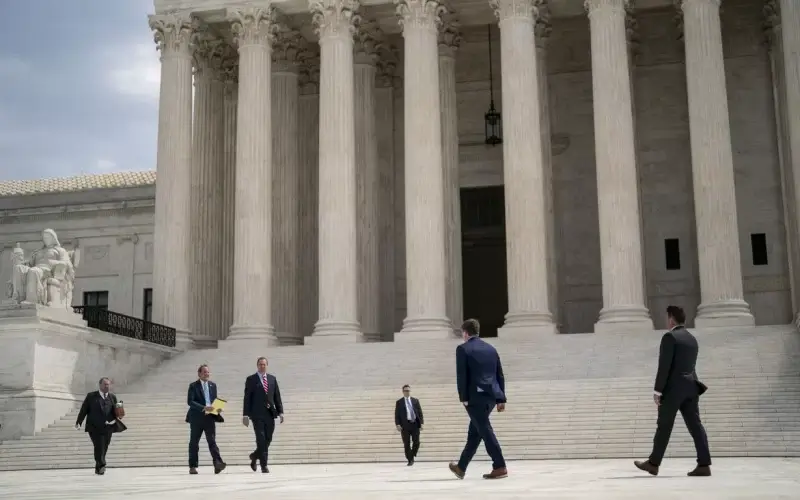The Supreme Court has voted to strike down the landmark Roe v. Wade decision, according to an initial draft majority opinion written by Justice Samuel Alito circulated inside the court and obtained by POLITICO.
The draft opinion is a full-throated, unflinching repudiation of the 1973 decision which guaranteed federal constitutional protections of abortion rights and a subsequent 1992 decision – Planned Parenthood v. Casey – that largely maintained the right. “Roe was egregiously wrong from the start,” Alito writes.
“We hold that Roe and Casey must be overruled,” he writes in the document, labeled as the “Opinion of the Court.” “It is time to heed the Constitution and return the issue of abortion to the people’s elected representatives.”
Deliberations on controversial cases have in the past been fluid. Justices can and sometimes do change their votes as draft opinions circulate and major decisions can be subject to multiple drafts and vote-trading, sometimes until just days before a decision is unveiled. The court’s holding will not be final until it is published, likely in the next two months.
The immediate impact of the ruling as drafted in February would be to end a half-century guarantee of federal constitutional protection of abortion rights and allow each state to decide whether to restrict or ban abortion. It’s unclear if there have been subsequent changes to the draft.
No draft decision in the modern history of the court has been disclosed publicly while a case was still pending. The unprecedented revelation is bound to intensify the debate over what was already the most controversial case on the docket this term.
The draft opinion offers an extraordinary window into the justices’ deliberations in one of the most consequential cases before the court in the last five decades. Some court-watchers predicted that the conservative majority would slice away at abortion rights without flatly overturning a 49-year-old precedent. The draft shows that the court is looking to reject Roe’s logic and legal protections.
A person familiar with the court’s deliberations said that four of the other Republican-appointed justices – Clarence Thomas, Neil Gorsuch, Brett Kavanaugh and Amy Coney Barrett – had voted with Alito in the conference held among the justices after hearing oral arguments in December, and that line-up remains unchanged as of this week.
The three Democratic-appointed justices – Stephen Breyer, Sonia Sotomayor and Elena Kagan – are working on one or more dissents, according to the person. How Chief Justice John Roberts will ultimately vote, and whether he will join an already written opinion or draft his own, is unclear.
The document, labeled as a first draft of the majority opinion, includes a notation that it was circulated among the justices on Feb. 10. If the Alito draft is adopted, it would rule in favor of Mississippi in the closely watched case over that state’s attempt to ban most abortions after 15 weeks of pregnancy.
A Supreme Court spokesperson declined to comment or make another representative of the court available to answer questions about the draft document.
POLITICO received a copy of the draft opinion from a person familiar with the court’s proceedings in the Mississippi case along with other details supporting the authenticity of the document. The draft opinion runs 98 pages, including a 31-page appendix of historical state abortion laws. The document is replete with citations to previous court decisions, books and other authorities, and includes 118 footnotes. The appearances and timing of this draft are consistent with court practice.
The disclosure of Alito’s draft majority opinion – a rare breach of Supreme Court secrecy and tradition around its deliberations – comes as all sides in the abortion debate are girding for the ruling. Speculation about the looming decision has been intense since the December oral arguments indicated a majority was inclined to support the Mississippi law.
Under longstanding court procedures, justices hold preliminary votes on cases shortly after argument and assign a member of the majority to write a draft of the court’s opinion. The draft is often amended in consultation with other justices, and in some cases the justices change their votes altogether, creating the possibility that the current alignment on Dobbs v. Jackson Women’s Health Organization could change.
The chief justice typically assigns majority opinions when he is in the majority. When he is not, that decision is typically made by the most senior justice in the majority.
A George W. Bush appointee who joined the court in 2006, Alito argues that the 1973 abortion rights ruling was an ill-conceived and deeply flawed decision that invented a right mentioned nowhere in the Constitution and unwisely sought to wrench the contentious issue away from the political branches of government.
Alito’s draft ruling would overturn a decision by the New Orleans-based 5th Circuit Court of Appeals that found the Mississippi law ran afoul of Supreme Court precedent by seeking to effectively ban abortions before viability.
Roe’s “survey of history ranged from the constitutionally irrelevant to the plainly incorrect,” Alito continues, adding that its reasoning was “exceptionally weak,” and that the original decision has had “damaging consequences.”
“The inescapable conclusion is that a right to abortion is not deeply rooted in the Nation’s history and traditions,” Alito writes.
Alito approvingly quotes a broad range of critics of the Roe decision. He also points to liberal icons such as the late Justice Ruth Bader Ginsburg and Harvard Law Professor Laurence Tribe, who at certain points in their careers took issue with the reasoning in Roe or its impact on the political process.
Alito’s skewering of Roe and the endorsement of at least four other justices for that unsparing critique is also a measure of the court’s rightward turn in recent decades. Roe was decided 7-2 in 1973, with five Republican appointees joining two justices nominated by Democratic presidents.
The overturning of Roe would almost immediately lead to stricter limits on abortion access in large swaths of the South and Midwest, with about half of the states set to immediately impose broad abortion bans. Any state could still legally allow the procedure.
“The Constitution does not prohibit the citizens of each State from regulating or prohibiting abortion,” the draft concludes. “Roe and Casey arrogated that authority. We now overrule those decisions and return that authority to the people and their elected representatives.”
The draft contains the type of caustic rhetorical flourishes Alito is known for and that has caused Roberts, his fellow Bush appointee, some discomfort in the past.
At times, Alito’s draft opinion takes an almost mocking tone as it skewers the majority opinion in Roe, written by Justice Harry Blackmun, a Richard Nixon appointee who died in 1999.
“Roe expressed the ‘feel[ing]’ that the Fourteenth Amendment was the provision that did the work, but its message seemed to be that the abortion right could be found somewhere in the Constitution and that specifying its exact location was not of paramount importance,” Alito writes.
Alito declares that one of the central tenets of Roe, the “viability” distinction between fetuses not capable of living outside the womb and those which can, “makes no sense.”
In several passages, he describes doctors and nurses who terminate pregnancies as “abortionists.”
When Roberts voted with liberal jurists in 2020 to block a Louisiana law imposing heavier regulations on abortion clinics, his solo concurrence used the more neutral term “abortion providers.” In contrast, Justice Clarence Thomas used the word “abortionist” 25 times in a solo dissent in the same case.
Alito’s use of the phrase “egregiously wrong” to describe Roe echoes language Mississippi Solicitor General Scott Stewart used in December in defending his state’s ban on abortions after 15 weeks of pregnancy. The phrase was also contained in an opinion Kavanaugh wrote as part of a 2020 ruling that jury convictions in criminal cases must be unanimous.









